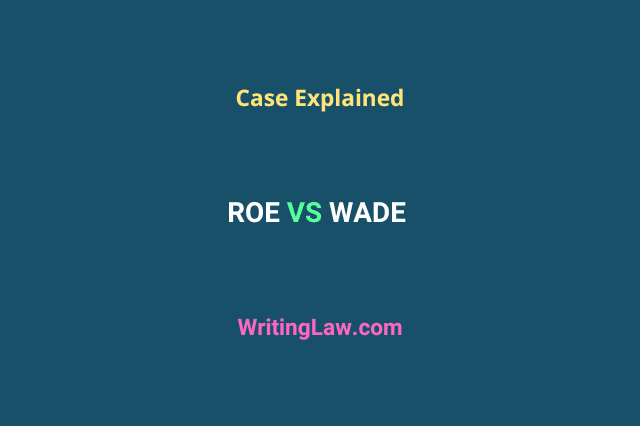
The U.S. Supreme Court reversed its 49-year-old landmark Roe vs Wade (410 U.S. 113) decision on June 24, 2022, which established the constitutional right to abortion in the United States.
In the present case of Dobbs vs Jackson Women’s Health Organization, the petitioner challenged Mississippi’s ban on abortion after 15 weeks. By its majority, the American Supreme Court affirmed Mississippi’s law banning abortions after 15 weeks and overruled its previous decision of Roe vs Wade.
This law article deals with the facts, arguments, and decisions of the Roe vs Wade case, keeping in mind the recent related developments.
Facts of the Roe vs Wade Case
It was the period of the 1970s in the United States. During that time, it was illegal to perform abortions in Texas without a physician’s consent unless it was to save the mother’s life.
In 1973, an unmarried pregnant woman, Jane Roe (name changed), brought a suit against Texas abortion laws on behalf of herself and others. There was a claim that doctors could not follow state abortion laws because they were too vague. And also, according to the United States Constitution, abortion right is protected by the fundamental “Right to Privacy.”
Arguments Given by Roe
These were the points put forward by Roe in the Roe vs Wade case:
- The Texas law violated the Bill of Rights’ rights to marital, family, and sexual privacy;
- The law violates the 14th Amendment of the U.S. Constitution;
- It violates the right to liberty of individuals;
- Abortion is an absolute right – a woman can end a pregnancy at any time, for any reason, however, she chooses.
Arguments Given by the Texas State
The Texas state made the following points:
- The 14th Amendment protects a fetus as a “person”;
- The government has a responsibility to protect the health of people, maintain medical standards, and protect prenatal life;
- The state has a compelling interest in protecting prenatal life from conception.
The question before the U.S. Supreme Court was: “Are women entitled to terminate their pregnancies by abortion under the United States Constitution”?
Judgement of Roe vs Wade (January 22, 1973)
In the majority opinion of 7:2 written by Justice Harry A. Blackmun, the Supreme Court held that abortion during the first trimester of pregnancy is an absolute right of the women. Justice Harry Blackmun delivered the opinion for the majority held that according to the due process clause of the 14th Amendment to the United States Constitution, pregnant women have a constitutionally protected right to an abortion under the “Right to Privacy” provision.
An abortion is within the right to privacy protected by the Due Process Clause of the 14th Amendment. The right to abortion is violated by a state law that restricts abortion regardless of pregnancy stage or other interests. Pregnant women’s health and “human potential” are legitimate state interests, but the relative weights of each interest change during pregnancy, and the law must take these variations into account.
The court further added that the decision regarding abortion during the first three months of pregnancy belongs to the woman and her doctor.
Nevertheless, the court found that the right to abortion is not absolute and must be balanced with the government’s interest in protecting women.
In addition, the court deemed abortion a “fundamental right,” which mandated that courts evaluate challenged abortion laws using the “strict scrutiny” standard, the strictest level of judicial review available in the United States.
Judgement of Dobbs vs Jackson Women’s Health Organization (June 24, 2022)
In this decision, Justice Samuel Alito delivered the judgment with the 6:3 majority and upheld Mississippi’s abortion law banning abortion after 15 weeks.
Overruling Roe vs Wade, the court ruled that there is no constitutional right to abortion. The time has come for the government to heed the Constitution and put abortion under the control of elected representatives.
In his view, the decision in Roe vs Wade is not only a wrong decision, but it amounts to an abuse of judicial authority. Also, the Constitution does not mention abortion, and abortion is not implicitly protected by any constitutional provision, including the Due Process Clause of the 14th Amendment.
Conclusion
With Roe vs Wade overturned, abortion access in the U.S. is no longer constitutionally protected. In light of the court’s decision, now individual states can decide whether abortion should be free or restricted. States now can even criminalise abortion.
However, many philanthropists argue that abortion right is a matter of personal freedom. According to them, banning or restricting abortions violates women’s rights because they have all control over their bodies and should have the freedom to decide whether to continue a pregnancy or not.
One big question also arose after the overruling of the Roe vs Wade decision is what happens if any pregnancy is due to the result of sexual violence like rape!
Read Next:
1. Is an Unmarried Woman Legally Allowed to Have an Abortion in India?
2. Medical Termination of Pregnancy Act, 1971
References: CNBC | Britannica
- What Is Remission Under Criminal Law in India? - 12th November 2023
- What Is the Doctrine of Part Performance Under the Transfer of Property Act? - 4th September 2023
- What Is the Places of Worship Act, 1991 and Its Objectives? - 30th July 2023







